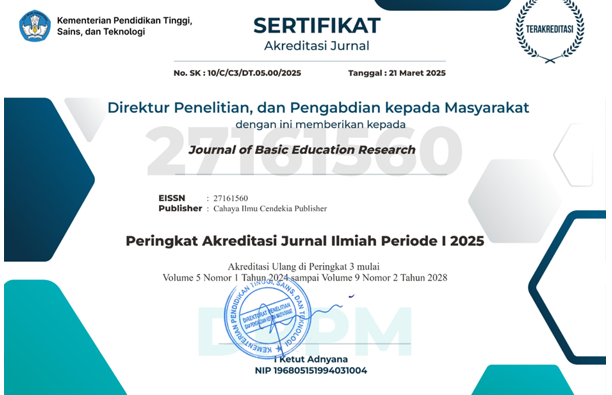Exploring the Experiences of STEM Students in Writing Research: Insights, Challenges, and Strategies
Abstract
Purpose of the study: This study aims to explore and examine the experiences and narratives of thirty-two (32) students from the Philippine Science High School - Ilocos Region Campus (PSHS-IRC) as they engaged in conducting and writing STEM research.
Methodology: The study used a descriptive phenomenological design to explore the research experiences of 32 students from PSHS-IRC. Data was collected via open-ended questionnaires and in-depth interviews. Thematic analysis identified key themes, validated through member checking and intercoder agreement, ensuring reliability and accuracy of insights.
Main Findings: Research writing presents numerous challenges for students, including literature searching, resource limitations, procrastination, motivation, and time management. Key difficulties involve finding credible sources, organizing research, defining problems, and drafting sections like the methodology and conclusion. Strategies such as seeking help, improving sourcing techniques, and prioritizing tasks can mitigate these challenges, enhancing students’ research experience.
Novelty/Originality of this study: This study highlights student challenges in research writing, providing insights for educators and administrators to improve research education. The findings also serve as a valuable reference for future studies in STEM education, offering guidance for scholars interested in exploring similar topics and enhancing academic support systems.
References
S. Alsied and N. Ibrahim, “Exploring challenges encountered by EFL libyan learners in research teaching and writing - the International Academic Forum (IAFOR),” The International Academic Forum (IAFOR), Oct. 03, 2022. https://eric.ed.gov/?id=EJ1167254
A. C. Bocar, “Difficulties encountered by the student – Researchers and the effects on their research output, S.Y. 2008-2009,” SSRN Electronic Journal, Jan. 2009, doi: 10.2139/ssrn.1612050.
J. M. Lodge, G. Kennedy, L. Lockyer, A. Arguel, and M. Pachman, “Understanding difficulties and resulting confusion in learning: an integrative review,” Frontiers in Education, vol. 3, Jun. 2018, doi: 10.3389/feduc.2018.00049.
F. Hoferichter, S. Kulakow, and D. Raufelder, “How teacher and classmate support relate to students’ stress and academic achievement,” Frontiers in Psychology, vol. 13, Nov. 2022, doi: 10.3389/fpsyg.2022.992497.
Piqc, “research outputs of senior high school students | philippine institute of quezon city,” Philippine Institute of Quezon City, Oct. 24, 2017. https://www.piqc.edu.ph/research-outputs-senior-high-school-students/
Department of Education, “Science High schools,” 1993. Accessed: Mar. 03, 2024. [Online]. Available: https://www.deped.gov.ph/wp-content/uploads/2018/10/DO_s1993_69-1.pdf
C. K. Howson and M. Kingsbury, “Educational expertise as prestige: research-intensive curriculum change,” Teaching in Higher Education, pp. 1–18, May 2023, doi: 10.1080/13562517.2023.2215702.
B. M. Nozaleda, “The ideal-actual gap in the roles of research in teaching: the case of STEM educators in a philippine university,” Formatif Jurnal Ilmiah Pendidikan MIPA, vol. 11, no. 2, Nov. 2021, doi: 10.30998/formatif.v11i2.6182.
T. Mapolisa and O. Mafa, “Challenges being experienced by undergraduate students in conducting research in open and distance learning,” Oct. 01, 2012. https://archive.aessweb.com/index.php/5007/article/view/2340
H. Khankeh, M. Ranjbar, D. Khorasani-Zavareh, A. Zargham-Boroujeni, and E. Johansson, “Challenges in conducting qualitative research in health: A conceptual paper,” Iranian Journal of Nursing and Midwifery Research, vol. 20, no. 6, p. 635, Jan. 2015, doi: 10.4103/1735-9066.170010.
S. Neema and L. Chandrashekar, “Research funding—why, when, and how?,” Indian Dermatology Online Journal, vol. 12, no. 1, p. 134, Jan. 2021, doi: 10.4103/idoj.idoj_684_20.
H. K. Soe, N. Than, H. Lwin, M. N. Htay, K. Phyu, and A. Abas, “Knowledge, attitudes, and barriers toward research: The perspectives of undergraduate medical and dental students,” Journal of Education and Health Promotion, vol. 7, no. 1, p. 23, Jan. 2018, doi: 10.4103/jehp.jehp_61_17.
B. Aeon, A. Faber, and A. Panaccio, “Does time management work? A meta-analysis,” PLoS ONE, vol. 16, no. 1, p. e0245066, Jan. 2021, doi: 10.1371/journal.pone.0245066.
S. Shrivastava and P. Shrivastava, “Data collection process in qualitative research: Challenges and potential solutions,” Medical Journal of Dr D Y Patil Vidyapeeth, vol. 0, no. 0, p. 0, Jan. 2022, doi: 10.4103/mjdrdypu.mjdrdypu_871_21.
J. F. Torrendon, “Difficulties encountered by the student researchers,” Rlee, Apr. 2021, [Online]. Available: https://www.academia.edu/37570860/Difficulties_Encountered_by_the_Student_Researchers
O. Thummapol, T. Park, M. Jackson, and S. Barton, “Methodological challenges faced in doing research with vulnerable women: reflections from fieldwork experiences,” International Journal of Qualitative Methods, vol. 18, p. 160940691984302, Jan. 2019, doi: 10.1177/1609406919843022.
R. Campillan, “IJMAS Difficulties in research writing among communication students in a private University,” 2019. https://ijmas.iraj.in/paper_detail.php?paper_id=16472&name=Difficulties_in_Research_Writing_among_Communication_Students_in_a_Private_University (accessed Apr. 09, 2024).
Y. Almahameed and M. Alajalein, “Difficulties faced by jordanian undergraduate EFL students in writing research problem statement,” International Journal of Humanities Arts and Social Sciences, vol. 7, no. 1, Mar. 2021, doi: 10.20469/ijhss.7.20002-1.
S. Zafar, M. Kamran, H. Raza, and A. Mehtab, “Challenges faced by novice research students at undergraduate level: A qualitative study at institute of education and research,” Review of Applied Management and Social Sciences, vol. 4, no. 2, pp. 411–420, Jun. 2021, doi: 10.47067/ramss.v4i2.142.
F. Qasem and E. Zayid, “The challenges and problems faced by students in the early stage of writing research projects in l2, university of bisha, saudi arabia,” European Journal of Special Education Research, vol. 4, no. 1, 2013, doi: 10.5281/zenodo.2557036.
E. Akyürek and Ö. Afacan, “Problems encountered during the scientific research process in graduate education: The institute of educational sciences,” Higher Education Studies, vol. 8, no. 2, p. 47, Apr. 2018, doi: 10.5539/hes.v8n2p47.
P. J. Raymunde and V. H. Mamonong, “Unfolding the lived experiences of the college students’ language learning strategies vis-à-vis their english proficiency: a convergent design,” International Journal of Language and Literary Studies, vol. 4, no. 2, pp. 1–19, Jun. 2022, doi: 10.36892/ijlls.v4i2.805.
D. Silverman, “Qualitative Research,” Google Books, 2016. https://books.google.com.ph/books/about/Qualitative_Research.html?id=TrwtDAAAQBAJ&redir_esc=y
M. Padilla-Díaz, “Phenomenology in educational qualitative research: philosophy as science or philosophical science?,” International Journal of Educational Excellence, vol. 1, no. 2, pp. 101–110, Aug. 2015, doi: 10.18562/ijee.2015.0009.
S. Campbell et al., “Purposive sampling: complex or simple? research case examples,” Journal of Research in Nursing, vol. 25, no. 8, pp. 652–661, Jun. 2020, doi: 10.1177/1744987120927206.
J. Fereday and E. Muir-Cochrane, “Demonstrating rigor using thematic analysis: a hybrid approach of inductive and deductive coding and theme development,” International Journal of Qualitative Methods, vol. 5, no. 1, pp. 80–92, Mar. 2006, doi: 10.1177/160940690600500107.
Creswell, J.W. “Research Design Qualitative, Quantitative, and Mixed Methods Approaches. 4th Edition, SAGE Publications, Inc., London. - References - Scientific Research Publishing.” 2013. https://www.scirp.org/reference/referencespapers?referenceid=1485543
A. Mitchell and M. Rich, “Challenges of writing an effective literature review for students and new researchers of business.,” European Conference on Research Methodology for Business and Management Studies, vol. 21, no. 1, pp. 141–148, May 2022, doi: 10.34190/ecrm.21.1.169.
A. G. D. Holmes, “Researcher positionality - a consideration of its influence and place in qualitative research - a new researcher guide,” Shanlax International Journal of Education, vol. 8, no. 4, pp. 1–10, Sep. 2020, doi: 10.34293/education.v8i4.3232.
M. Khan, M. Khan, A. Annona, and S. Islam, “Challenges of topic selection for dissertation at the undergraduate level in bangladesh,” Canadian Journal of Educational and Social Studies, vol. 3, no. 2, Jan. 2023, doi: 10.53103/cjess.v3i2.120.
H. Snyder, “Literature review as a research methodology: An overview and guidelines,” Journal of Business Research, vol. 104, pp. 333–339, Aug. 2019, doi: 10.1016/j.jbusres.2019.07.039.
A. Grewal, H. Kataria, and I. Dhawan, “Literature search for research planning and identification of research problem,” Indian Journal of Anaesthesia, vol. 60, no. 9, p. 635, Jan. 2016, doi: 10.4103/0019-5049.190618.
A. Bredan, “Conducting publishable research under conditions of severely limited resources,” Libyan Journal of Medicine, vol. 15, no. 1, p. 1688126, Nov. 2019, doi: 10.1080/19932820.2019.1688126.
A. Grund and S. Fries, “Understanding procrastination: A motivational approach,” Personality and Individual Differences, vol. 121, pp. 120–130, Sep. 2017, doi: 10.1016/j.paid.2017.09.035.
J.-A. D. Chase et al., “Time Management Strategies for Research Productivity,” Western Journal of Nursing Research, vol. 35, no. 2, pp. 155–176, Aug. 2012, doi: 10.1177/0193945912451163.
K. C. Hei and M. K. David, “Basic and advanced skills they don’t have: the case of postgraduates and literature review writing.,” 2015. https://eric.ed.gov/?id=EJ1134669.
M. D. B. Maznun, R. Monsefi, and V. Nimehchisalem, “Undergraduate ESL students’ difficulties in writing the introduction for research reports,” Advances in Language and Literary Studies, vol. 8, no. 1, p. 9, Jan. 2017, doi: 10.7575/aiac.alls.v.8n.1p.9.
K. Ameen, S. H. Batool, and M. A. Naveed, “Difficulties novice LIS researchers face while formulating a research topic,” Information Development, vol. 35, no. 4, pp. 592–600, May 2018, doi: 10.1177/0266666918774875.
Y. L. Cheung, “Exploring first-year undergraduates’ difficulties in writing the discussion section of a research paper: A singapore Study,” The English Teacher, vol. 42, no. 2, 2013, [Online]. Available:
S. N. Sato et al., “Navigating the new normal: adapting online and distance learning in the post-pandemic era,” Education Sciences, vol. 14, no. 1, p. 19, Dec. 2023, doi: 10.3390/educsci14010019.
S. Pervaiz, G. Li, and Q. He, “The mechanism of goal-setting participation’s impact on employees’ proactive behavior, moderated mediation role of power distance,” PLoS ONE, vol. 16, no. 12, p. e0260625, Dec. 2021, doi: 10.1371/journal.pone.0260625.
F. Zheng, “Fostering Students’ Well-Being: The mediating role of teacher interpersonal behavior and Student-Teacher Relationships,” Frontiers in Psychology, vol. 12, Jan. 2022, doi: 10.3389/fpsyg.2021.796728.
Copyright (c) 2025 Dominic Patric Galdonez

This work is licensed under a Creative Commons Attribution 4.0 International License.
Authors who publish with this journal agree to the following terms:
- Authors retain copyright and acknowledge that the Journal of Basic Education Research is the first publisher licensed under a Creative Commons Attribution 4.0 International License.
- Authors are able to enter into separate, additional contractual arrangements for the non-exclusive distribution of the journal's published version of the work (e.g., post it to an institutional repository or publish it in a book), with an acknowledgment of its initial publication in this journal.
- Authors are permitted and encouraged to post their work online (e.g., in institutional repositories or on their website) prior to and during the submission process, as it can lead to productive exchanges and earlier and greater citation of published work.





.png)


.png)
.png)


















